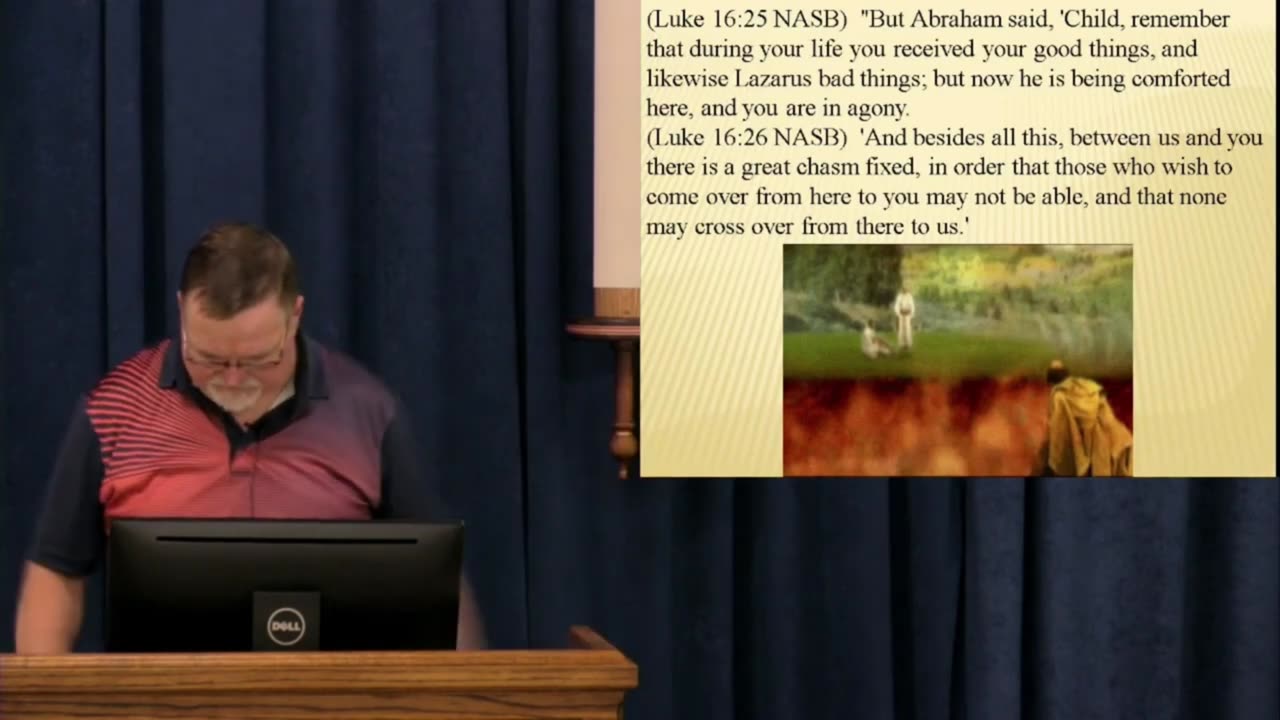Premium Only Content

Gen 15 - Abram was declared righteous due to his faithfulness. Believe -H539 aman, to be faithful
Abram (Later on, Elohim changes his name to Abraham), had just rescued Lot and his household from the kings of the East. He was probably fearful of retribution, Elohim tells him don't fear them, Elohim says that He is Abraham's shield. The enemy is powerless against Him, and Elohim says your reward is going to be very great and Abram is going to find out more about his reward in this chapter. Abram is confused concerning a provision of Elohim. He's thinking perhaps Elohim is not going to provide him in a direct and literal manner as he was told. Abram thought that Elohim was maybe speaking in a metaphorical sense, there is someone born in my household, he’s not mine, but maybe that's who that's supposed to be, my heir that He's speaking of. He didn't take Elohim at his literal word, but of course you know, Abraham's getting up there in age, there are no kids, doubt could creep in. I could see that happening, he should have understood though, Elohim literally meant what He said. Abram was counted as righteous for believing in Yahweh. Abram had been patient, his cry for help was going to be answered, he was declared righteous due to his faithfulness in Yahweh. The Hebrew word for believe is H539 aman, (aw-man’) it means to be faithful. It doesn't mean to have a strong emotion toward Jesus, it means to be faithful, he was faithful to Elohim and Elohim declared that as righteousness for him. Just along the same lines in the Hebrew the word faithfulness is a word that's built upon aman, aman is the root for it and it is H530 emunah, and it means faithfulness. Being faithful and faithfulness are two words from the root of the other. Paul talks about this too, he said you have faithfulness to me you are a hundred years old and you're still faithful that you're going to have a son, that's strong faithfulness. Paul talks about this a lot actually, he points out the fact that Abraham's faithfulness was reckoned to him as righteousness, Paul makes interesting, it was long before he was circumcised. Paul said you know what, before Abraham was circumcised, he was declared righteous through his faithfulness.
Romans 4:3-22 Paul made a really big deal about this thing of Abraham being declared righteous before he was circumcised.
He also will go a little bit of Galatians here too; he went into the same account in Galatians 3:6-14 There are some things in Galatians a little hard to understand but he is battling those that say you don't need Messiah, just be obedient to our laws. Paul says, there's death there, there's nothing but death there, we do need Messiah. So, Abraham's faithfulness in following Torah is why he was declared righteous.
Genesis 26:3-5 (He's talking to Isaac here) You see, it's one thing to say we're being faithful to the Father and to His Torah, it's another thing to say through the blood of Messiah, because that's where it flowed from, it's another thing to say I don't need Messiah. All I need to do is follow the rules, that's not faithfulness, that's just following rules. Faithfulness implies a love and a covenant between the two people. The consummation of the Covenant takes place, Abram sleeps through it. Abram had nothing to offer for this, he might as well be asleep. Elohim, as a smoking oven and a flaming torch, passed through the pieces of animals cut up by Abram. Here's the thing, there's a covenant being made but Abram’s not placed on the same plane as Elohim is, not at all. Abram, as far as men go, he may be the greatest man that ever lived. But he's not on any plane with Elohim or even close. As a matter of fact, Elohim must condescend in grace to come to man in His graciousness. Abram was just a recipient of a gift from Yahweh his sole qualification was the willingness to receive Elohim’s gift of mercy, that's it. Even that willingness, was a gift from Elohim also. The parallels between this covenant and the sacrifice of Yeshua are numerous and they are profound. Neither covenant involve traditional Levitical sacrifices that include an altar or include the Levites. Neither sacrifice did, both sacrifices involved the cutting of the sacrifices. So, they all involve the land of inheritance both covenants did. The covenant with Abram is that land, it's much larger than the Land of Israel we see today. Inheriting that land for all eternity in resurrected bodies through the grace of Elohim, will be for those whom He chose to have faithfulness and Torah and in Messiah Yeshua. This covenant is very, very, important, this covenant has nothing to do with bloodline, this covenant has nothing to do with circumcision. It has to do with whether or not we are truly sons of Abraham and as Paul points out, that's their faithfulness.
-
 LIVE
LIVE
Robert Gouveia
5 hours agoHouse Speaker Vote LIVE; Johnson FIGHTS to Survive; Staged NOLA Home Tour; Las Vegas Texts
4,286 watching -
 10:42
10:42
Russell Brand
3 hours agoJOE ROGAN IS SPEECHLESS
40.6K56 -
 1:36:20
1:36:20
The Quartering
5 hours agoCybertruck Psyop? Fishy New Orleans Video & FBI BUSTED In Major Coverup!
49.5K36 -
 2:08:45
2:08:45
Tucker Carlson
5 hours agoBernard Hudson: New Orleans Attack, Cybertruck Explosion, CIA Corruption, & Tusli Gabbard
144K156 -
 8:33
8:33
Chef Donny
3 hours agoWarm Up With Some Delicious Wild Rice Soup| Tasty Tailgating Ep. 16 Presented By Pepsi
8.42K3 -
 9:35
9:35
SLS - Street League Skateboarding
10 days agoHow Sora Shirai Won SLS Tokyo 2024 | Best Tricks
13.4K2 -
 DVR
DVR
GingerDonkey
4 hours agoThe DONKEY Barn is open for business
27.8K4 -
 40:12
40:12
jessedalba
18 hours ago $0.76 earnedRumble Movie:“Riding an Electric Harley 2,500 Miles to Sturgis… What Could Go Wrong?!”
18.7K9 -
 10:22
10:22
Dr Disrespect
3 days agoDR DISRESPECT - 2024 RECAP
60.6K78 -
 18:03
18:03
Neil McCoy-Ward
7 hours agoThe US 'INCIDENTS' Are just The Tip Of The Iceberg...
19.5K7